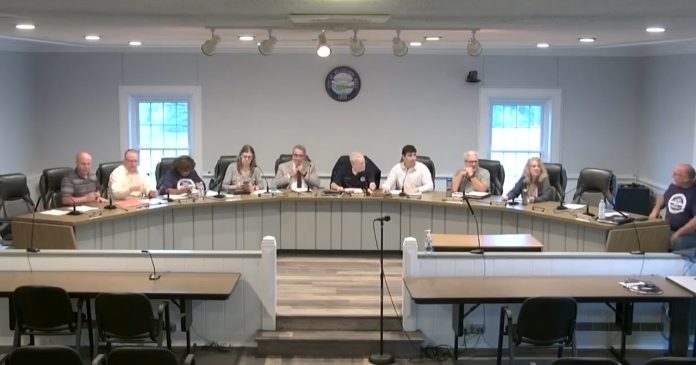Willoughby Hills City Council took several steps toward improving municipal operations during its working committee meeting Sept. 22, with significant progress on wireless telecommunications regulations and financial planning.
The council discussed four key pieces of legislation, with emergency declarations on most items to expedite implementation.
Wireless Tower Standards Updated
Council President Michael Kline led discussion on an amended ordinance that would modify wireless telecommunication facility regulations. The updated standards eliminate requirements for “stealth technology” – towers disguised as trees or flags – and revise safety zone requirements around cell towers.
The ordinance removes a 200-foot setback requirement, instead requiring towers remain within property boundaries if they collapse. Engineering certifications would verify designated fall zones around each installation.
“Cell towers don’t collapse. They will bend. They also call it crimping where they’ll bend like a straw but they don’t break,” Kline explained during the meeting.
The changes aim to open more potential locations for cell towers in residential areas where cellular service gaps exist. Council members indicated having at least one site ready for evaluation under the new standards.
Financial Agreements Move Forward
Finance Director Bruce Scott presented three financial items requiring council approval before county deadlines.
The city would enter a three-year contract with Rea & Associates Inc. for annual financial statement preparation following Generally Accepted Accounting Principles for fiscal years 2025-2027.
Two resolutions address 2026 tax matters – accepting Lake County Budget Commission rates and requesting advance tax payments from the county auditor.
Scott emphasized timing importance for the tax-related resolutions to meet county submission deadlines.
Software Update Warning
Scott also warned council members about upcoming financial software replacement costs. The city’s current CMI Authority Finance subscription expires in August 2027, requiring implementation planning to begin soon.
The last system upgrade cost approximately $76,000 with $19,500 annual licensing fees. Scott expects similar expenses for the next conversion, potentially requiring 2027 budget planning.
Other Business
Council scheduled its first district meeting for Sept. 23 at 7 p.m., with Mayor Christopher Hallum noting the earlier timing due to the election year.
Kline also reminded residents about the final episode of a television program featuring local Frank Lloyd Wright house construction, airing Tuesday on Magnolia channel and Wednesday on HBO Max.
Present at the meeting were Councilman Joe Jarmuszkiewicz, Council President Kline, Councilman Dan Knecht, Councilwoman Vicki Miller, Councilwoman Kathleen Sivo, Council Vice President Tanya Taylor Draper, Mayor Hallum, Law Director Michael Lucas, City Engineer Pete DiFranco and Finance Director Scott. Councilwoman Julie A. Belich was absent.












